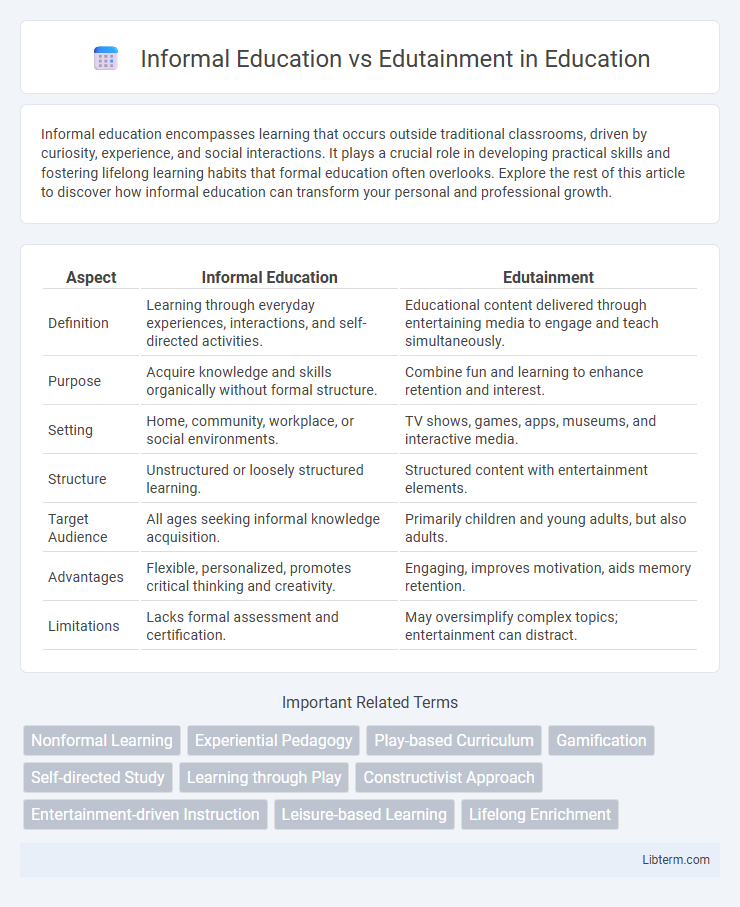Informal education encompasses learning that occurs outside traditional classrooms, driven by curiosity, experience, and social interactions. It plays a crucial role in developing practical skills and fostering lifelong learning habits that formal education often overlooks. Explore the rest of this article to discover how informal education can transform your personal and professional growth.
Table of Comparison
| Aspect | Informal Education | Edutainment |
|---|---|---|
| Definition | Learning through everyday experiences, interactions, and self-directed activities. | Educational content delivered through entertaining media to engage and teach simultaneously. |
| Purpose | Acquire knowledge and skills organically without formal structure. | Combine fun and learning to enhance retention and interest. |
| Setting | Home, community, workplace, or social environments. | TV shows, games, apps, museums, and interactive media. |
| Structure | Unstructured or loosely structured learning. | Structured content with entertainment elements. |
| Target Audience | All ages seeking informal knowledge acquisition. | Primarily children and young adults, but also adults. |
| Advantages | Flexible, personalized, promotes critical thinking and creativity. | Engaging, improves motivation, aids memory retention. |
| Limitations | Lacks formal assessment and certification. | May oversimplify complex topics; entertainment can distract. |
Understanding Informal Education
Informal education encompasses learning that occurs outside traditional classrooms, driven by curiosity and real-life experiences, enhancing personal development and practical skills. It contrasts with edutainment, which blends education and entertainment to engage audiences primarily through multimedia content. Understanding informal education reveals its role in fostering lifelong learning, critical thinking, and adaptability beyond structured curricula.
What is Edutainment?
Edutainment combines education and entertainment to create engaging learning experiences through multimedia, games, and interactive content that captivate audience attention. This approach enhances knowledge retention by making complex concepts accessible and enjoyable, often used in museums, educational TV shows, and digital platforms. Unlike traditional informal education, edutainment leverages entertainment elements to motivate learners and facilitate active participation.
Key Differences Between Informal Education and Edutainment
Informal education involves self-directed learning experiences outside formal curricula, emphasizing real-world application and personal interest without strict evaluation. Edutainment combines educational content with entertainment, using games, videos, or interactive media to engage learners while delivering instructional messages. The key difference lies in informal education's open, learner-driven approach versus edutainment's structured, entertainment-infused delivery aimed at enhancing motivation and retention.
Learning Outcomes: Informal Education vs Edutainment
Informal education fosters deep, self-driven knowledge acquisition through real-world experiences and social interactions, enhancing critical thinking and problem-solving skills. Edutainment combines entertainment with educational content, increasing engagement and motivation but often prioritizes enjoyment over comprehensive understanding. Learning outcomes in informal education tend to be more durable and transferable, while edutainment's outcomes excel in short-term retention and interest generation.
Engagement Techniques in Both Approaches
Engagement techniques in informal education often include hands-on activities, peer collaboration, and real-world problem-solving, fostering intrinsic motivation and active participation. Edutainment leverages multimedia tools such as games, videos, and interactive storytelling to captivate audiences and maintain attention through entertainment value. Both approaches utilize immersive experiences, but informal education centers on experiential learning while edutainment prioritizes entertainment-driven engagement.
Real-World Applications and Examples
Informal education encompasses learning experiences outside formal schooling, such as community workshops and mentorships, fostering practical skills like communication and problem-solving. Edutainment blends education with entertainment through platforms like interactive apps and educational games, enhancing engagement while teaching subjects like history or science. Real-world examples include museum exhibits using augmented reality for immersive history lessons and YouTube channels offering DIY tutorials that combine learning with entertainment value.
Benefits of Informal Learning
Informal learning fosters personalized knowledge acquisition through everyday experiences, enhancing critical thinking and problem-solving skills in real-world contexts. It promotes lifelong learning by encouraging curiosity and self-motivation without the constraints of formal curricula. This flexible approach adapts to individual interests, making education more engaging and relevant outside traditional classroom settings.
Advantages of Edutainment for Modern Learners
Edutainment combines education and entertainment, making learning more engaging and interactive for modern learners who often prefer multimedia content. It leverages games, videos, and storytelling to improve retention and motivation by catering to diverse learning styles. This approach fosters creativity, critical thinking, and collaboration, essential skills in today's fast-paced, technology-driven world.
Challenges and Limitations of Each Method
Informal education often faces challenges such as lack of structured curriculum, inconsistent learner engagement, and difficulty in assessing knowledge retention, which limit its effectiveness in delivering comprehensive learning outcomes. Edutainment, while engaging and accessible, can sometimes prioritize entertainment over educational depth, leading to superficial understanding and reduced critical thinking development. Both methods struggle with scalability and standardization, making it difficult to ensure quality and measurable progress across diverse learner populations.
Choosing the Right Approach for Lifelong Learning
Informal education provides personalized, experience-based learning that adapts to individual interests and real-world contexts, while edutainment combines educational content with entertainment to increase engagement and motivation. Selecting the right approach depends on learners' goals, cognitive styles, and environments, with informal education fostering deep, self-directed knowledge and edutainment enhancing retention through interactive, enjoyable experiences. Lifelong learning benefits from a strategic balance of both methods to cultivate continuous curiosity and practical skills.
Informal Education Infographic

 libterm.com
libterm.com